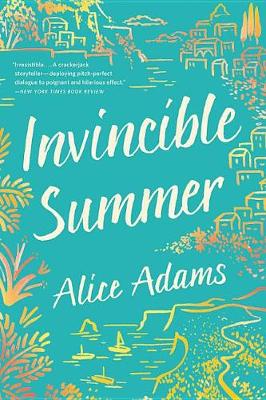Reviewed by brokentune on
"The streets of Hampstead teemed with belligerent old ladies and their posses of tiny canines, and they weren’t to be trifled with."
I must admit that I only picked this up because it fit one of the squares of a Summer Bingo Challenge. Otherwise, I would have judged the book by its cover and it's description, and I would have decided that this was probably fluffy chick lit.
I would have lost out. Big time.
Invincible Summer is the story of four friends, who try to come to terms with their lives, romantic entanglements, careers, family, and each other over the course of 20 years. Yes, there is some romance in it, some heartbreak, some drama, but it is all described quite realistically, and with a great sense of balance for fun and seriousness.
In a way, the book reminded me of the film Notting Hill, only that the book had a little more depth, and no bumbling Hugh Grant characters.
There were some aspects, like the mental breakdown of one of the characters, that really were handled quite well, even if all problems seemed to conveniently resolve themselves.
I really can't fault the author for this, tho. Sometimes, convenient solutions are what help the book focus on the character development rather than to get stuck with the depressing state of the human condition.
Also, I loved that Adams included a couple of scenes that were inspired by the works of Albert Camus, an author I have a lot of love for. The title "Invincible Summer" itself is taken from one of Camus' works, and the quote on which it is based is the centre point of the book. I really loved this, the scene in original work fitted really well with the scene in Adams' book. It also sparked my interest in re-reading some of Camus work. (Even if this meant that I found a second quote used by Adams to be a misquote, which is believed to have originated in the early 2000s rather than with Camus....)
No matter. Invincible Summer was moving, engaging, and thought-provoking for all the right reasons.
"A ridiculous response to these glimpses of other people’s lives playing out, she chided herself, because if life had taught her one thing it was that appearances rarely tell the real story. She’d spent long enough tending to her own carefully cultivated work persona to know that apparently calm exteriors could have all sorts of things seething underneath. You could look through the windows at any one of these people, but you would only ever see what was there, not what wasn’t. The losses and absences didn’t show, despite so often being the immovable facts around which a life orbited. That woman, laughing as she herded her protesting children to the table, she might have a story you wouldn’t see at a glance. You wouldn’t be able to see the miscarriages she had before those children came along, or the brother who’d died, or the father she’d had to put into a home because his dementia had become too much to handle. All you saw was the bright flash of happiness, and it wasn’t anything close to the whole truth."
Reading updates
- Started reading
- 10 July, 2016: Finished reading
- 10 July, 2016: Reviewed
